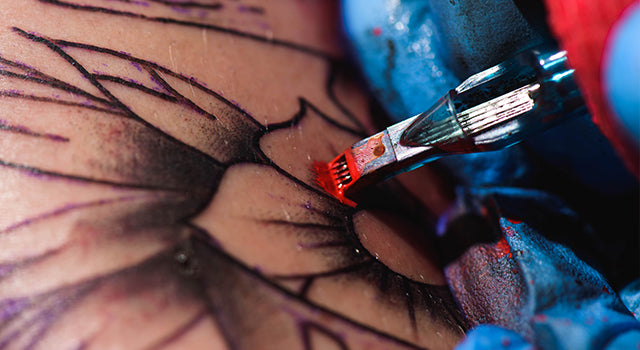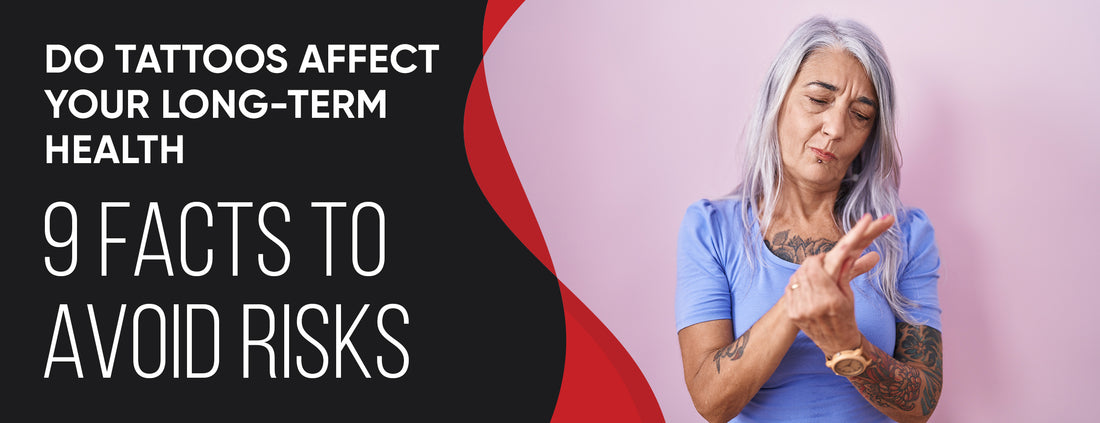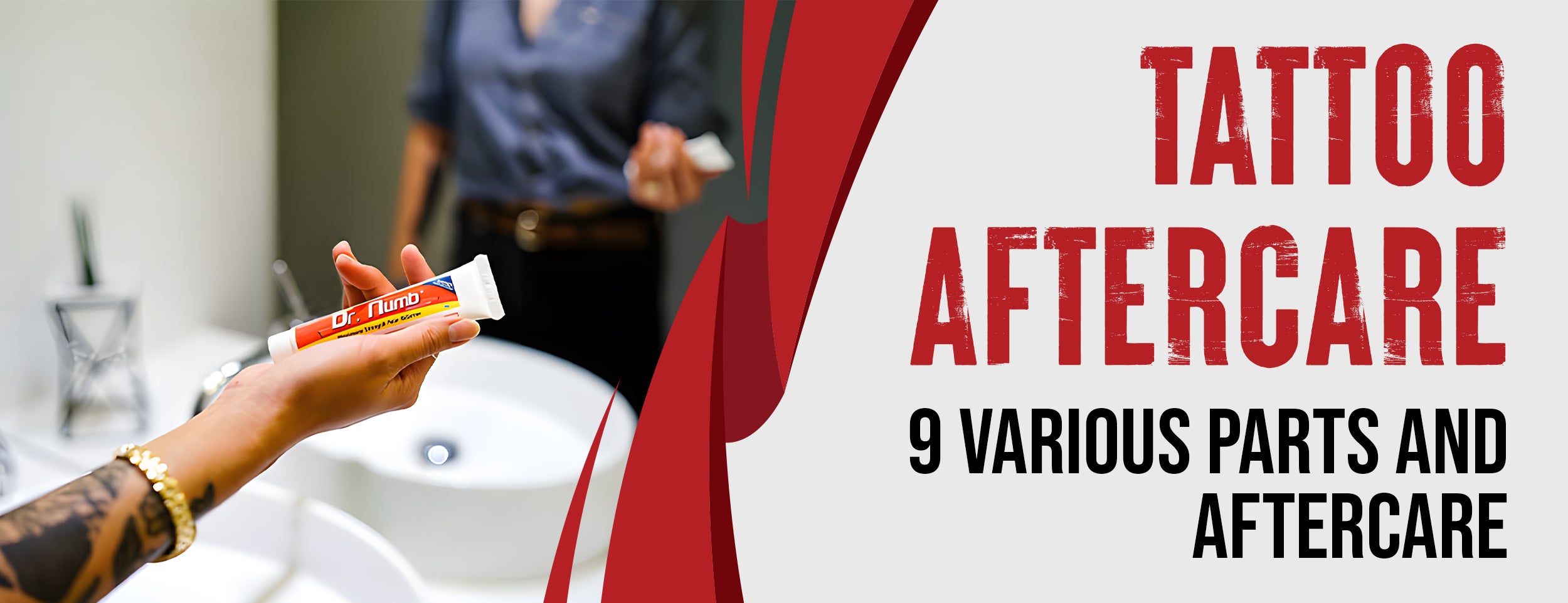Long-term tattoo health effects can be problematic, with potentially severe and irreversible complications. It's crucial to consider the possible risks associated with tattoos.
Approximately 7% of people experience long-term issues with tattoos after several years. The chances of tattoo ink causing health issues are very low. You should talk to your doctor about your potential health effects and your tattoo artist and try a skin test if you're worried about an allergy.
This blog post will explore how tattoos impact our long-term physical and psychological health. We will also provide some safety measures that you can take to reduce the chances of health complications from getting tattoos.
Do Tattoos Affect Your Long-Term Health: 9 Major Facts

While tattoos are considered a form of self-expression, assessing their impact on an individual's long-term health is essential. We'll explore aspects of the long-term effects of tattoos: the impact on the immune system.
Skin Damage
- Tattoos involve the injection of ink beneath the skin's surface, which can cause damage to the skin over time.
- Excessive tattooing can lead to skin thinning, scarring, and potentially even skin infections.
Cancer Risks Associated with Tattooing
- Some tattoo inks contain potentially harmful chemicals, such as carcinogens, that may increase the risk of cancer development.
- Prolonged or repeated exposure to these chemicals during tattooing may increase this risk.
Impact on the Immune System
- Tattooing involves skin piercing, which triggers an immune response to fight off potential infections.
- This constant immune response may lead to chronic inflammation linked to various autoimmune diseases.
Blood-borne Diseases
- Using contaminated needles during tattooing can increase the risk of blood-borne diseases such as HIV or Hepatitis B.
- Ensuring that proper sanitation protocols are followed during the tattooing process is essential to decrease the risk of infection.
Lymph Node Problems
- The injection of tattoo ink can cause the ink particles to migrate to nearby lymph nodes.
- This may cause an inflammatory response in the lymph nodes, potentially leading to chronic swelling.
Allergic Reactions
- Some individuals may experience an allergic reaction to the ink, or other substances used during the tattooing process.
- This can cause symptoms such as itching, swelling, or even a potentially life-threatening allergic reaction.
Infections and Related Risks
- Tattooing involves creating an open wound in the skin, which can increase the risk of infection.
- If an infection is left untreated, it can lead to severe complications such as sepsis or necrotizing fasciitis.

Compromising Personal Health
- While tattoos may seem harmless, they can have profound implications for individuals with certain health conditions.
- Individuals with compromised immune systems or chronic medical conditions may be more susceptible to wound infections, allergic reactions, or other potential complications.
Ink Toxicity
- Some tattoo inks may contain toxic substances, such as heavy metals, that can accumulate in the body over time.
- Long-term exposure to these chemicals can lead to organ damage, neurological impairment, or cancer development.
Long-term Effects of Tattoos: 4 Psychological Risks
You may be considering getting a tattoo or curious about how tattoos affect your health. While tattoos have become more mainstream and accepted in society, there are still potential psychological risks to consider besides the physical effects.
Perceptions of People with Tattoos in the Workplace
- Many employers still hold negative views of tattoos, which can limit job opportunities for those with visible tattoos.
- Discrimination against visible tattoos can increase stress and anxiety for job-seekers and employees.
- Employers need to recognize individuality and cultural differences in the workplace.
Negative Connotations Associated with Tattoos in Society
- Negative stereotypes and misconceptions about people with tattoos can lead to discrimination and biases.
- These negative connotations can contribute to social anxiety and isolation for those with visible tattoos.
- Society must embrace diversity and promote acceptance and understanding of different cultures and lifestyles.
Emotions and Motivations Behind Tattoo Regret
- Tattoo removal can be complicated and costly, leading to potential emotional distress and regret.
- Considering the emotional motivations behind getting tattoos, such as peer pressure or impulsive decisions, is essential.
- Taking the time to think carefully about whether to get a tattoo can prevent future emotional distress and regret.
Safe and Practical Options for Tattoo Removal

- Laser tattoo removal is a popular and effective method for removing tattoos, but it can be expensive and cause discomfort.
- Alternative methods such as surgical removal, dermabrasion, and chemical peels may be less effective than laser removal but can be more affordable.
- It is essential to consult with a professional before choosing a tattoo removal method to ensure the safest and most effective treatment option.
Long-term Health Effects of Tattoos: Safety Measures
Tattoos are a form of self-expression, but they can also have long-term impacts on your health. It's essential to take safety measures to prevent any possible health complications. We will discuss the safety measures for avoiding health complications from tattoos.
Hygiene During the Tattooing Process
During the tattooing process, it is crucial to maintain a high level of hygiene. This means that the tattoo artist and the equipment used must be clean and free of any kind of infection. Here are some safety measures that need to be taken during the tattooing process:
- The tattoo artist must wash their hands and wear disposable gloves before starting the tattoo.
- Use disposable needles and tubes, which should be opened before the client.
- The work area, including the tattoo table, should be clean and sanitized before and after use.
- The tattoo artist should also use sterilized equipment and disinfectants to prevent the spread of infections.

Personal Precautions for Reducing Long-Term Risks
Here are some personal precautions that need to be taken to reduce any long-term risks associated with tattoos:
- Avoid getting a tattoo if you have any medical conditions that may complicate the healing process.
- Keep the tattooed area clean and dry.
- Apply an antibiotic ointment to the tattooed area to prevent any infections.
- Avoid exposing the tattooed area to direct sunlight, as it can cause the colors to fade and cause skin damage.
Tattoo Artists with Reputation
It is essential to use a professional and reputable tattoo artist. A skilled and licensed tattoo artist will follow safety measures during the tattooing process. Here are some tips for choosing the right tattoo artist:
- Do your research and get recommendations from friends or family.
- Look for an artist who specializes in the tattoo style you're looking for.
- Check the artist's portfolio and reviews from previous clients.
- Ensure the tattoo artist is licensed to operate in your locality.
Conclusion
Tattoos may be fashionable, trendy, and cultural; however, they come with long-term health risks that one must consider. Tattooing can damage our skin, compromise our health, and contribute to physical and psychological pain.
But safe tattoo practices, like using a reputable tattoo artist, maintaining a high level of personal hygiene, and understanding tattoo’s long-term effects on health, can go a long way in ensuring our well-being. So before getting a tattoo, we must identify the right tattooing conditions to promote overall health and, ultimately, take care of ourselves.













![Antibiotics and Tattoos: 3 Risks and 3 Effects [with 4 Precautions]](http://drnumb.com/cdn/shop/articles/Can_You_Get_Tattooed_On_Antibiotics__3_Risks_and_3_Effects_4_Precautions.jpg?v=1714128292)

